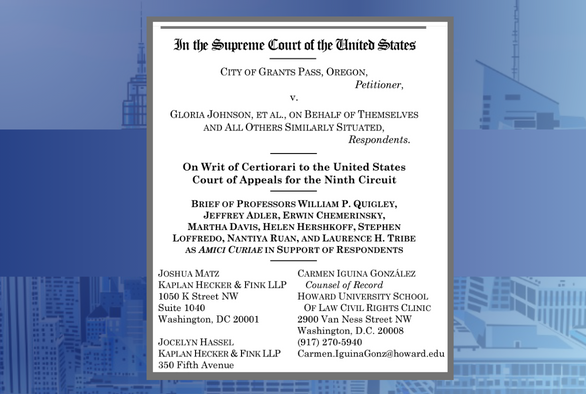On April 3, 2024, KHF and the Howard University School of Law Civil Rights Clinic filed an amicus brief in the U.S. Supreme Court on behalf of legal scholars and historians with expertise in the history of vagrancy laws in the U.S. in support of Respondent in City of Grants Pass, Oregon v. Johnson. The brief urges the Supreme Court to reject the argument that Ordinances restricting camping in city parks and other public areas are supported by a historical tradition of vagrancy laws.
The brief explains that early vagrancy laws were significantly different than the Ordinances in their purpose, scope, and structure, as those early laws served to aide residents unable to work, mandated the banishment of poor migrants, and ensured an adequate labor supply through forced labor or imprisonment. The Ordinances in question do not serve these purposes and instead function to punish and banish unhoused persons from City limits. Moreover, the brief argues that the history and tradition of vagrancy laws exemplify why Eighth Amendment jurisprudence looks to evolving standards of decency, rather than relying solely on historical precedent. The historical tradition of vagrancy laws is offensive to modern standards of liberty, equality, and decency, as such laws were used in some of the most disturbing, discriminatory, and abusive exercises of government power throughout American history.
The filing, which can be read in full here, reflects the firm’s continued commitment to working towards equity and justice for all.
The KHF team includes Carmen Iguina González, Joshua Matz, and Jocelyn Hassel. The Howard Civil Rights Clinic student team included Lerato Cummings, Thomas Joyce, Azza Khalifa, Xavier Richie, and Simeon Spencer. KHF has partnered with the Howard Civil Rights Clinic for two years, and KHF Counsel Carmen Iguina González currently serves as the Director of the clinic.
